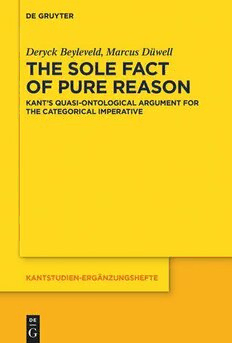Table Of ContentDeryckBeyleveld,MarcusDüwell
TheSoleFactofPureReason
Kantstudien-Ergänzungshefte
Im Auftrag der Kant-Gesellschaft
herausgegeben von
Manfred Baum, Bernd Dörflinger,
Heiner F. Klemme und Konstantin Pollok
Band 210
Deryck Beyleveld, Marcus Düwell
The Sole Fact
of Pure Reason
Kant’s Quasi-Ontological Argument for the
Categorical Imperative
ISBN978-3-11-069125-2
e-ISBN(PDF)978-3-11-069134-4
e-ISBN(EPUB)978-3-11-069142-9
ISSN0340-6059
LibraryofCongressControlNumber:2020945680
BibliographicinformationpublishedbytheDeutscheNationalbibliothek
TheDeutscheNationalbibliothekliststhispublicationintheDeutscheNationalbibliografie;
detailedbibliographicdataareavailableontheInternetathttp://dnb.dnb.de.
©2020WalterdeGruyterGmbH,Berlin/Boston
Typesetting:IntegraSoftwareServicesPvt.Ltd.
Printingandbinding:CPIbooksGmbH,Leck
www.degruyter.com
Preface
ForalongtimewehavebeenconvincedthatthemethodologyofKant’strans-
cendentalphilosophyisthatofelicitingthestrictrequirementsofhumanagen-
tial self-understanding and subjecting them to critique. Thus, when Kant says
thatthecategoricalimperativeisanapriorisyntheticproposition,wemaintain
thatheconsidersacceptanceofittobeastrictrequirementofhumanagential
self-understanding.However,untilrelativelyrecently,wehavebeenpuzzledas
towhatexactlyKant’sargumentforthiscontentionis.Thissaid,wehavenever
seen good reason not to take him at his word that the argument he presents
andreliesonforthecategoricalimperativeinCritiqueofPracticalReason(CPrR)
is the same argument he presents in Groundwork of the Metaphysics of Morals
(GMM)(seeCPrRAK5:8).Forreasonswewillmakeclearinthisvolume,wehave
always found implausible and founded on very shaky grounds the widely ac-
cepted view that CPrR, by reasoning from the moral law to free will, abandons
GMM’sclaimthatthecategoricalimperativeisestablishedbyatranscendentalde-
duction. However, we struggled to provide a convincing portrayal of what Kant
doesinGMMandCPrRthatverifieshisconcordanceclaimuntilweconnectedhis
claimsaboutthesensuscommunistohisargumentforthecategoricalimperative
while reading Critique of the Power of Judgment (CPoJ) with students on the
ResearchMastersCourseinPhilosophyinUtrechtin2012.Oncethisconnectionis
made,whatKantsaysaboutthesensuscommunisprovidesstrongsupportfor
the viewthat the categorical imperative isthe maximof human agentialself-
understanding(themaximtorenderthinkingfromtheviewpointofthepartic-
ular agent that one is consistent with thinking of oneself from the viewpoint
of an agent per se). It also prompts re-evaluation of what Kant is designating
when he refers to common human understanding or common human reason
inGMMandCPrR.Assoonaswehypothesizedthathewas,thereby,referring
to the sensus communis of CPoJ, a completely different picture of the com-
monlyacceptedstructureoftheargumentofGMMemerged.Wehadassumed
alongwithalmosteveryoneelsethat,inthefirstsectionofGMM(GMMI),by
claiming that the categorical imperative is found in common human under-
standing,Kantmerelyclaimsthat
(1) peopleverygenerallythinkthatthereisacategoricalimperative;
(2) GMM II reveals (by analysis of the concept of a categorical imperative)
what those who believe that there is a categorical imperative must accept
aboutit;and
(3) GMMIIIattemptstoshowthatallhumanagentsmustbelievethatthereis
acategoricalimperative.
https://doi.org/10.1515/9783110691344-202
VI Preface
ButthinkingofthecommonhumanunderstandingofGMMIasthesensuscom-
munisofCPoJsuggestsadifferentview.When,e.g.,Kantsaysthatthecategori-
cal imperative is found entirely a priori in common human understanding
(GMM AK 4:406), he means that it is found in exercising the a priori powers
of mind of the sensus communis (which he says are powers all who possess
humanity in their persons must be thought to have [CPoJ AK 5:293–294]). And
this gives rise to the thought that he thinks that the categorical imperative is
given to human agents as something they must accept by understanding the
conceptofthesensuscommunisviewedastheconceptofhumanagentialself-
understanding; indeed, that the categorical imperative is the imperative to act
in accord with the strict requirements of agential self-understanding. On this
basis,becausehemaintainsthatunderstandingtheconceptofacategoricalim-
perativerequireshumanagentstothinkthattheyaregovernedbothbytheuni-
versallawofmechanismandthattheyhavefreewill(whichtheycannotbein
thesameaspect),thetaskforGMMIIIismerelytoshowthatsuchaconception
of what it is to be a human agent is coherent. We then found that thinking
aboutthestructureofGMMinthiswaymakessenseofsomeotherthingsthat
Kant says in GMM and CPrR that are otherwise very puzzling. Chief amongst
thesearetwothings.ThefirstiswhyKantthinksthathecanestablishasunde-
niable the actual, as against the merely possible, existence of the categorical
imperative simply by showing that it is rationally possible (coherent) to con-
sider that one has free will. The second is how he can ground the categorical
imperativeinpurepracticalreason(thelawofwhichisthemorallawassuch)
by reasoning that is not viciously circular, given that he views the categorical
imperative as the moral law as such in its application to finite heteronomously
affectedagents.Aboveall,thinkingaboutthestructureofGMMinthiswayen-
ablesustoseethattheargumentforthecategoricalimperativeinCPrRhas,as
Kantclaims,thesamelogicalstructureastheargumentinGMM.
We do not claim that our interpretation of Kant’s argument is entirely
novel.Indeed,therearemanyofitsdistinctiveelementsinwritings,mostnota-
bly, of Lewis White Beck, Pauline Kleingeld, Onora O’Neill, Klaus Steigleder,
Kenneth Westphal, and Michael Wolff. What we think we achieve in this vol-
ume is to put these elements together in a more complete and consistent way
thanothercommentatorshavedonebythewayinwhichwelinkKant’sclaims
about the common human understanding to his claims about the sensus com-
munisofCPoJandthedegreeofimportanceweattachtounderstandinghisar-
gumentforthecategoricalimperativeinrelationtotheroleitplaysinhismoral
argumentfortheexistenceofGod.
Numerouscolleaguesandfriendshavecommentedonaspectsofthisbookin
earlier drafts and presentations in colloquia and conferences. We owe particular
Preface VII
thankstoJoelAnderson,PatrickCapps,RutgerClaassen,DaschaDüring,Liesbeth
Feikema, Joshua Jowitt, Pauline Kleingeld, Cheryl Lancaster, William Lucy, Sem
de Maagt, Tim Meijers, Shaun D. Pattinson, Klaus Steigleder, Stuart Toddington,
KennethWestphal,andPaulZiche.HenkvanGilshelpedusingettinganoverview
over the literature. We have to thank Charlie Blunden, Bram Galenkamp, and
SjaroesSalimianforpreparingtheindexandNikèvanWijckforproofreadingthe
files.Aparticular thanks we owe toJan van Ophuijsen for hisenormouswork in
carefullycorrectingthefiles.
DeryckBeyleveld
MarcusDüwell
November2019
Contents
Preface V
ChapterOne
Introduction–SettingtheScene 1
ChapterTwo
Kant’sArgumentfortheCategoricalImperativeConstructed 35
ChapterThree
APrioriSyntheticPracticalPropositionsasStrictRequirements
ofHumanAgentialSelf-Understanding 57
ChapterFour
Kant’sJustificationintheContextofHisCriticalPhilosophy
asaWhole 71
ChapterFive
TheMoralLawastheSoleFactofPureReasoninCPrR 85
ChapterSix
TheMoralLawastheSoleFactofPureReasoninGMM 111
ChapterSeven
KlausSteiglederandMichaelWolff 141
ChapterEight
OwenWare 175
ChapterNine
HowValidisKant’sArgument? 187
Bibliography 199
SubjectIndex 205
PersonsIndex 211

